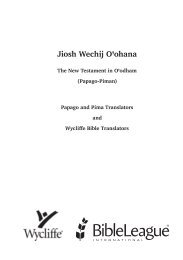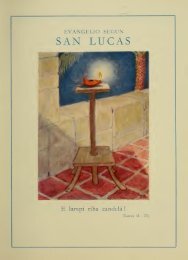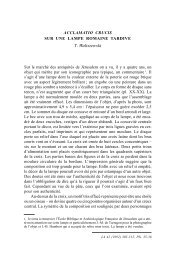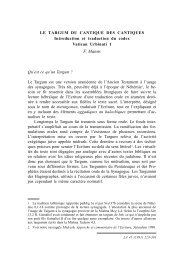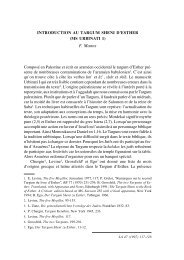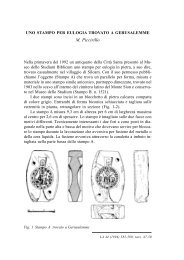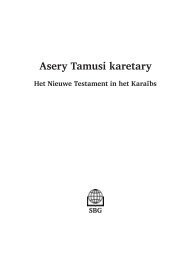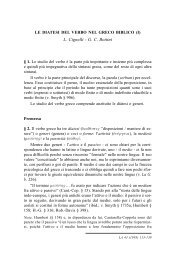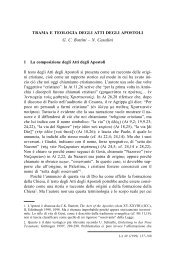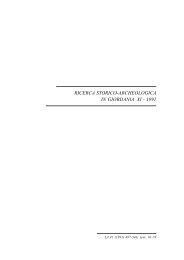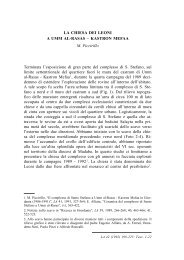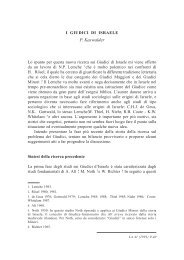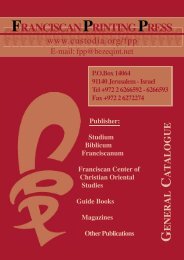Literary Criticism and Theology of P - Christus Rex
Literary Criticism and Theology of P - Christus Rex
Literary Criticism and Theology of P - Christus Rex
You also want an ePaper? Increase the reach of your titles
YUMPU automatically turns print PDFs into web optimized ePapers that Google loves.
20<br />
E. CORTESE<br />
temple, but rather in men’s heart. The general message <strong>of</strong> the prophet is that<br />
God has ab<strong>and</strong>oned His temple which has to be reconstructed <strong>and</strong> that the<br />
exiled people will return to their l<strong>and</strong>, <strong>and</strong> settle around the new temple. It is<br />
always by means <strong>of</strong> the temple that God will be present in Israel. The only<br />
text <strong>of</strong> Ezek on a spiritual divine presence is the above quoted 11,16, where<br />
the adverb mԠ points out the reduced <strong>and</strong> temporary form <strong>of</strong> such a presence.<br />
Besides, the famous promise <strong>of</strong> the new heart <strong>and</strong> the new spirit (36,26, where<br />
however the formula <strong>of</strong> the divine presence is not mentioned) is framed by<br />
the prophecy <strong>of</strong> the return to the l<strong>and</strong>, <strong>and</strong> it will be realized only there (36,24<br />
<strong>and</strong> 28). Our Christian reading <strong>of</strong> that promise extends up to the pr<strong>of</strong>ound<br />
meaning <strong>of</strong> the presence <strong>of</strong> the divine Spirit in the heart. But, as we shall see<br />
soon, this is the final stage <strong>of</strong> the promise <strong>and</strong> <strong>of</strong> the plan <strong>of</strong> God, that is the<br />
presence <strong>of</strong> God in Jesus Christ. The presence <strong>of</strong> the Spirit <strong>and</strong> the Trinity in<br />
us have their basis in the Incarnation <strong>of</strong> God which is not merely the divine<br />
presence contained in the Sinaitic relation between God <strong>and</strong> Israel. In other<br />
words, it is not purely a spiritual presence.<br />
Ezek 20 too, which has been emphasized by Pola after having reduced all<br />
the second part <strong>of</strong> P to Ex 29,45f. <strong>and</strong> 40,16.17a.33b, expounds the return to<br />
the l<strong>and</strong>. The holy mountain to which Israel is lead again is neither a spiritual<br />
mountain nor Sinai. The house <strong>of</strong> Israel will serve God in the l<strong>and</strong> (Ezek<br />
20,40); there He will accept them <strong>and</strong> their sacrifices, gathering them from<br />
all countries. He will bring them into the L<strong>and</strong> (20,41f.). Ezekiel testifies that<br />
the priestly theology <strong>of</strong> the divine presence implies the motif <strong>of</strong> the L<strong>and</strong>. So,<br />
against Pola <strong>and</strong> even against Noth, Pg cannot be trimmed as Pola does, but<br />
must follow through the episodes <strong>of</strong> the traveling till the borders <strong>of</strong> the<br />
L<strong>and</strong> 24 . Nobody denies today the importance <strong>of</strong> Ex 29,43ff. But the method<br />
<strong>of</strong> saving merely the central theme <strong>of</strong> the priestly document or only its<br />
“structural elements” in Ex 25-31 is wrong 25 . By this method, using the<br />
example <strong>of</strong> a palace, we should conclude that the original construction is only<br />
a central pillar, with few other “primitive” structures, whereas rooms, stairs,<br />
24. As I have demonstrated in my thesis La terra di Canaan nella storia sacerdotale del<br />
Pentateuco (SRB 5), Brescia 1972. Note that Noth, altough negating the interest <strong>of</strong> Pg for<br />
the theme <strong>of</strong> the l<strong>and</strong>, did not dare to eliminate completely the priestly document from Num,<br />
as Pola does.<br />
25. Pola, Die ursprüngliche Priesterschrift, 53-116. He classifies me among the Hexateuchian<br />
exegetes (for instance pp. 21 <strong>and</strong> 99), but, as far as Pg is concerned this is absolutely<br />
false. In my Josua 13-21. Ein priesterschriftlicher Abschnitt im deuteronomistischen<br />
Geschichtswerk (OBO 94), Freiburg Schw. 1990, I show that the second part <strong>of</strong> Jos is<br />
substantially Ps, but also that it has been translated from the end <strong>of</strong> the Tetrateuch, by the<br />
last redaction, which united Tetrateuch <strong>and</strong> Dtr Work.



